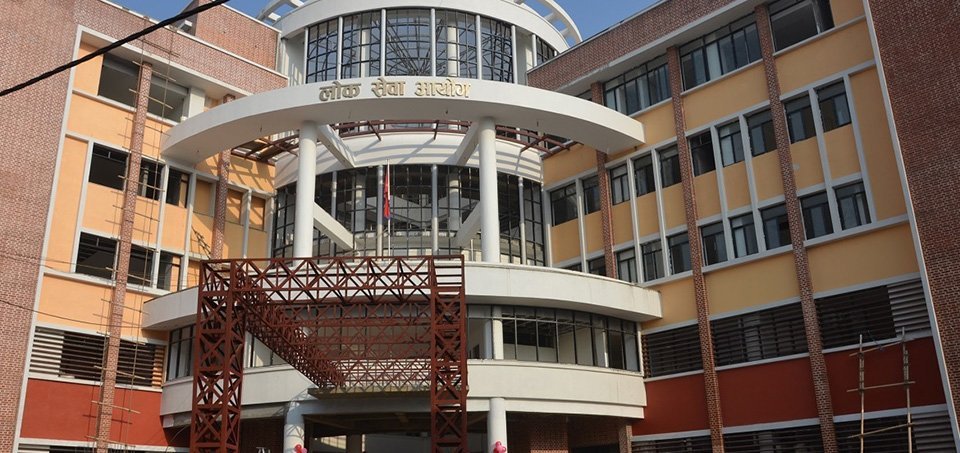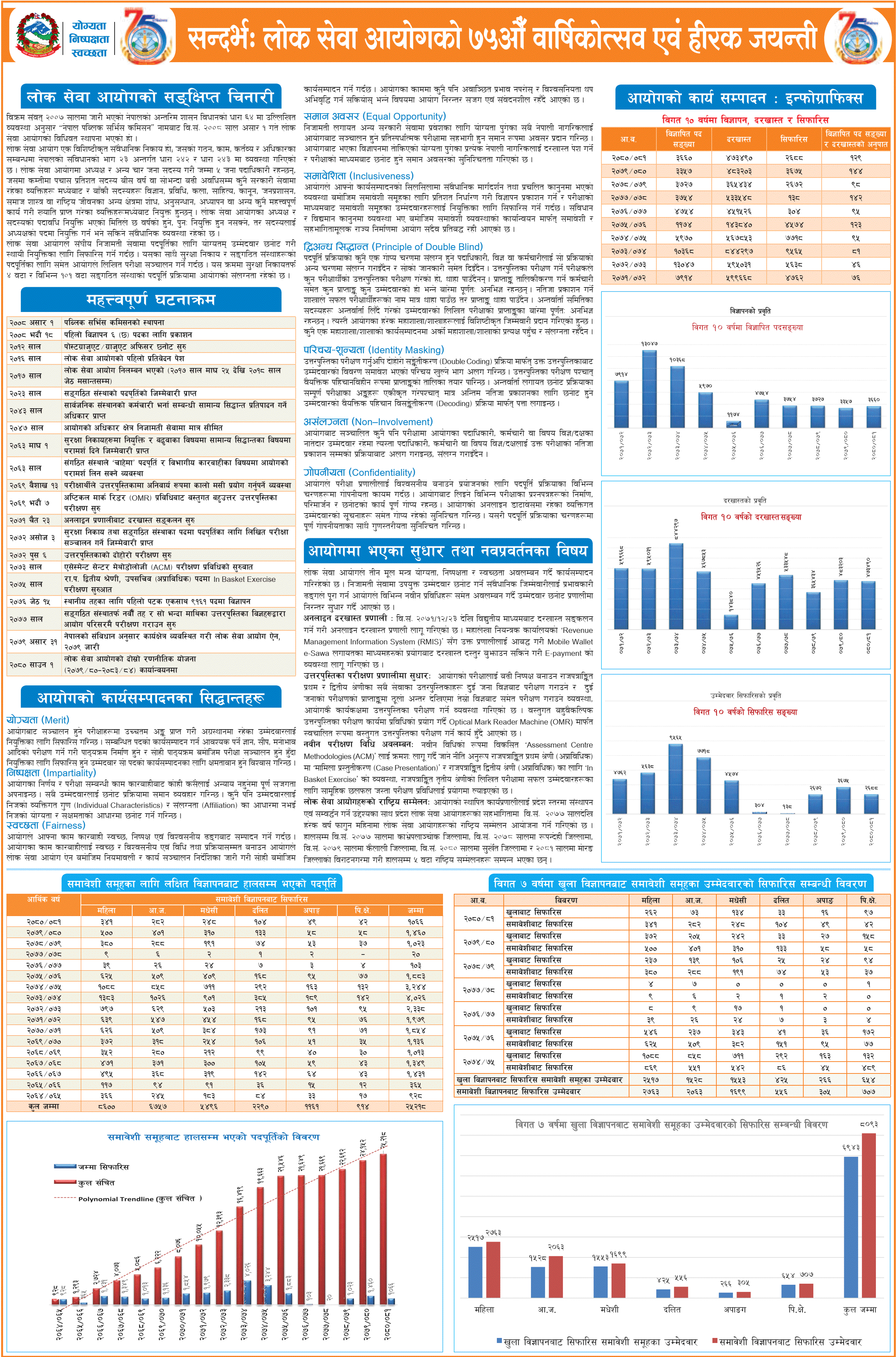
The Public Service Commission (PSC - Lok Sewa Aayog) of Nepal was officially established on 1st Ashad 2008 B.S., as per the provisions in Article 64 of the Interim Constitution of 2007 B.S. It was named the "Nepal Public Service Commission."
The PSC is a specialized constitutional body. Its formation, duties, and powers are defined in Part 23, Articles 242 and 243 of the Constitution of Nepal.
The Commission comprises five members, including a Chairperson. At least 50% of its members must be individuals who have served in government for 20 years or more. The remaining members are selected from persons recognized for their expertise in science, technology, arts, literature, law, public administration, sociology, or other significant national fields such as teaching, research, or notable public contributions.
The tenure of the Chairperson and members is six years from the date of appointment. Reappointment is not permitted, although a member may be promoted to Chairperson.
PSC's Core Functions and Scope
The Public Service Commission recommends candidates for permanent positions in the Federal Civil Service by selecting the most qualified individuals.
It also conducts written examinations for recruitment in security agencies and organized institutions. Currently, it oversees recruitment processes for 4 security agencies and 101 organized institutions.
Key Milestones in PSC History
-
1 Ashad 2008 B.S.: Establishment of Public Service Commission
-
18 Bhadra 2008 B.S.: First job vacancy announcement for 6 positions
-
2012 B.S.: Initiation of Postgraduate/Graduate Officer selection
-
2016 B.S.: First annual report submission
-
2017 B.S.: Suspension of the Commission (from 25 Magh 2017 to end of Jestha 2018)
-
2023 B.S.: Commission receives authority to recruit for organized institutions
-
2043 B.S.: Issued principles for recruitment in public institutions
-
2047 B.S.: Jurisdiction limited to civil service
-
2063 Magh 1: Advisory role on appointments and promotions in security agencies
-
2063 B.S.: Provision allowing organized institutions to consult PSC optionally
-
2069 Baisakh 13: Mandatory use of black ink in answer sheets
-
2069 Bhadra 7: Introduction of Optical Mark Reader (OMR) for objective testing
-
2071 Chaitra 23: Online application system launched
-
2072 Ashoj 3: Authority to conduct exams for security and organized bodies
-
2072 Poush 6: Initiation of double evaluation of answer sheets
-
2073 B.S.: Adoption of Assessment Centre Methodologies (ACM)
-
2075 B.S.: In Basket Exercise introduced for second-class (non-technical) officers
-
2076 Jestha 15: Advertisement of 9,161 positions for local governments
-
2077 B.S.: On-site evaluation by examiners for 9th level and above in institutions
-
2079 Ashad 31: Implementation of PSC Act 2079 as per the new Constitution
-
2080 Shrawan 1: Launch of second Strategic Plan (2079/80–2083/84)
Principles Guiding PSC Performance
Merit
Candidates scoring the highest in PSC exams are recommended for appointments. Exams are designed to evaluate knowledge, skills, and attitudes necessary for job performance, following a structured curriculum.
Impartiality
All candidates are treated equally. Selection is based solely on merit—not on personal characteristics or affiliations.
Fairness
PSC ensures its processes are clean, reliable, and legally sound. Rules and operational guidelines under the PSC Act are strictly followed to maintain credibility and prevent undue influence.
Equal Opportunity
Any Nepali citizen meeting the qualification criteria can apply and participate in the competitive examinations conducted by the Commission.
Inclusiveness
In line with constitutional and legal provisions, PSC ensures representation from inclusive groups through specific quotas in its advertisements and selection processes.
Double Blind Principle
Officers, experts, or staff involved in one confidential phase of recruitment are excluded from other phases. Evaluators do not know which candidate’s paper they are assessing, and staff preparing score sheets are unaware of whose marks they are recording.
Identity Masking
Before evaluation, all answer sheets undergo double coding to remove any personal information. Identity is revealed only after the final candidate selection is completed.
Non-Involvement
If any PSC officer, staff member, or subject expert has a relative among the candidates, they are removed from all stages of the examination process until results are published.
Confidentiality
Every stage of the recruitment process maintains strict confidentiality. Question paper preparation, revision, and selection are all handled in a secure manner. Candidates' personal data in PSC’s online system is also protected.
Reforms and Innovations
PSC has embraced continuous improvement and innovation while adhering to its foundational principles: merit, impartiality, and fairness. Key reforms include:
Online Application System
Introduced on 23 Chaitra 2071 B.S., the PSC began collecting applications online. This system is integrated with the Revenue Management Information System (RMIS) of the Office of the Controller of Accounts. Candidates can pay fees through platforms like e-Sewa.
Enhanced Evaluation System
To ensure fairness, answer sheets for First and Second Class gazetted officers are checked by two evaluators. If there is a significant difference between scores, a third evaluator is assigned. All assessments are conducted within the Commission’s premises.
Objective-type answer sheets are automatically evaluated using Optical Mark Reader (OMR) machines.
Innovative Testing Methods
Modern assessment tools, such as Assessment Centre Methodologies (ACM), have been gradually introduced. Case presentations are used for First Class non-technical positions, and In Basket Exercises for Second Class. Group discussions are part of the selection for Third Class officers.
National PSC Conferences
Since 2077 B.S., PSC has organized annual national conferences every Fagun to strengthen coordination with provincial PSCs. The five conferences so far were held in:
-
2077: Kavrepalanchok
-
2078: Rupandehi
-
2079: Kailali
-
2080: Surkhet
-
2081: Morang (Biratnagar)



